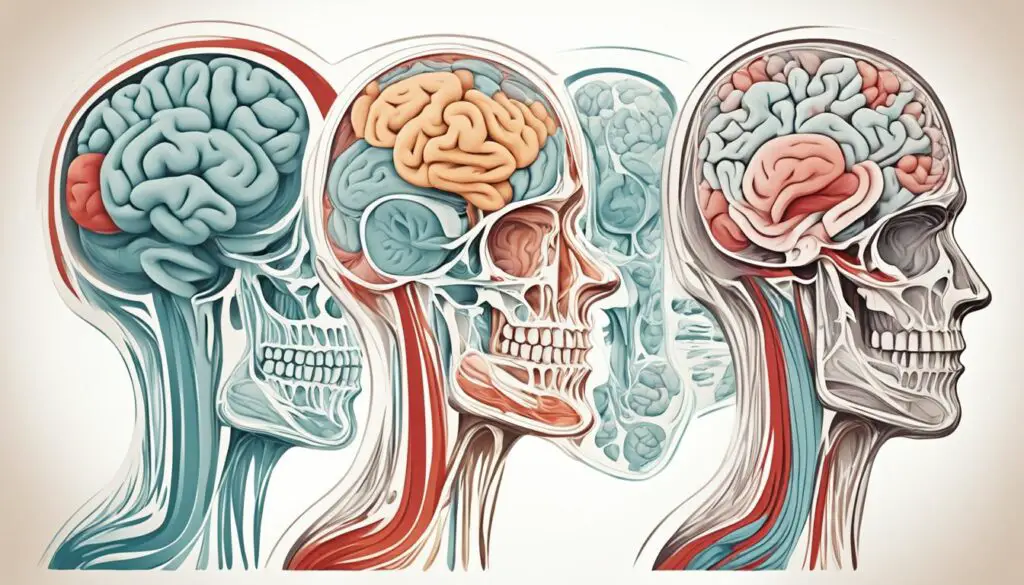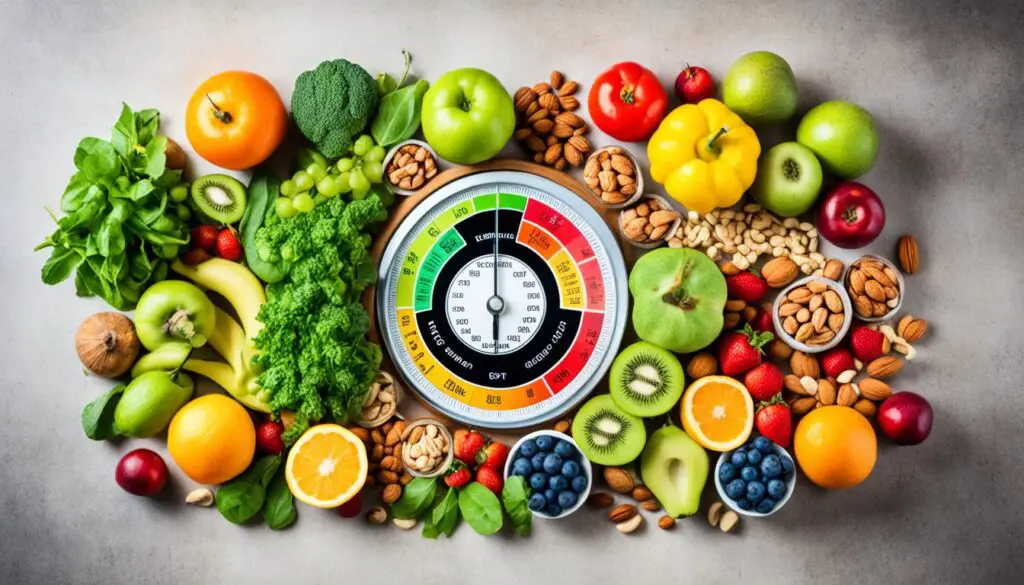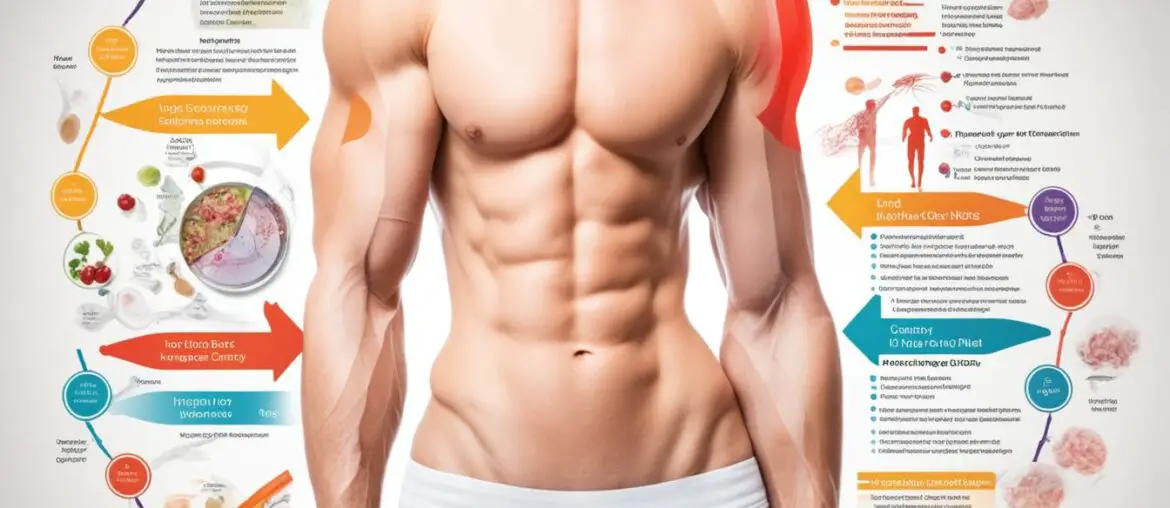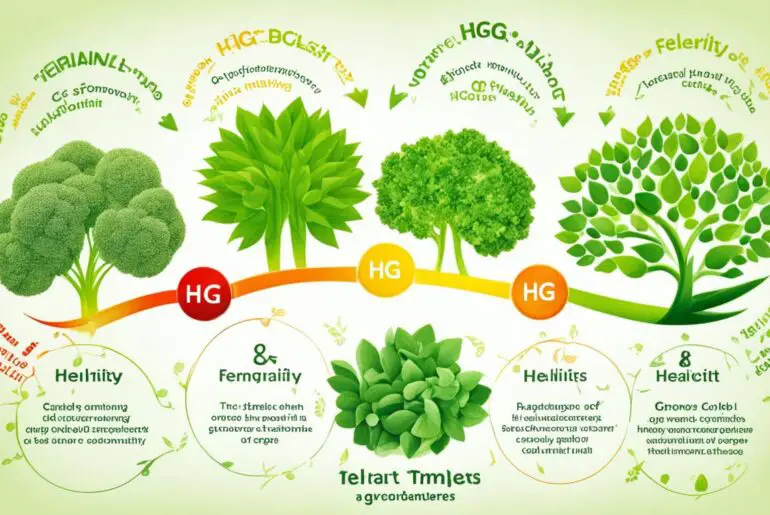When it comes to weight loss, there are countless diets and trends claiming to be the holy grail. One such diet that has gained popularity in recent years is the HCG diet. But what is the truth about its safety and the role of hormones in weight loss? Is the HCG diet a groundbreaking solution or a risky endeavor?
Join me as we dive deep into the world of HCG diet safety and hormone research. We’ll explore the scientific evidence, expert opinions, and potential risks associated with this controversial weight loss method. Prepare to challenge common beliefs and uncover the truth behind the HCG diet.
Key Takeaways:
- The HCG diet is not considered safe or effective according to the FDA.
- Severe calorie restriction diets like the HCG diet may lead to short-term weight loss but come with risks.
- There is no scientific evidence to support the claims of the HCG diet.
- Registered dietitians and women’s health experts unanimously agree that the HCG diet is dangerous and not recommended.
- There are safer and more effective methods for weight loss, such as a balanced diet and regular exercise.
Understanding the HCG Diet and its Claims
The HCG diet is a very low-calorie diet that is often accompanied by supplemental HCG injections. It claims to promote weight loss by stimulating the metabolism and targeting stored body fat. However, there is no scientific evidence to support these claims. The FDA does not approve the use of HCG for weight loss, and the prescription label states that it does not increase weight loss beyond caloric restriction. The severe calorie restriction and reliance on HCG injections make the diet potentially dangerous and unsustainable.
Recommended Foods on the HCG Diet
The HCG diet, known for its low-calorie approach to weight loss, focuses on specific food choices. By following the HCG diet, individuals limit their daily caloric intake to around 500 to 800 calories. To achieve the desired results, the diet emphasizes consumption of lean proteins, nonstarchy vegetables, and limited fruits.
Lean Proteins
Lean proteins are a cornerstone of the HCG diet. They provide essential nutrients while keeping calories in check. Skinless chicken breast, lean ground beef, and white fish are examples of lean proteins allowed on the diet. These options offer high-quality protein and minimal fat content, supporting weight loss goals.
Nonstarchy Vegetables
The HCG diet encourages the intake of nonstarchy vegetables, which are low in calories and high in fiber. These vegetables include cauliflower, spinach, zucchini, and cucumber. Incorporating these nutrient-rich vegetables into meals helps add flavor, texture, and important vitamins and minerals to the diet.
Limited Fruits
While fruits are generally limited on the HCG diet due to their natural sugar content, some options are allowed in small amounts. Berries and melons, such as strawberries and cantaloupe, offer a refreshing and naturally sweet addition to the meal plan. These fruits should be consumed in moderation to adhere to the low-calorie guidelines of the diet.
By following the recommended foods on the HCG diet, individuals can adhere to the low-calorie restrictions while still receiving essential nutrients. Lean proteins, nonstarchy vegetables, and limited fruits form the foundation of this diet plan, supporting weight loss efforts in a balanced and controlled manner.
Safety Concerns and Risks of the HCG Diet

The HCG diet may come with several potential side effects and risks that should be considered before embarking on this weight loss journey. It is important to be aware of these potential dangers to make an informed decision.
Side Effects and Physical Discomfort
- Fatigue: Some individuals on the HCG diet report experiencing fatigue, which may be attributed to the low-calorie intake and restricted food choices.
- Irritability: The severe calorie restriction can lead to irritability and mood changes, potentially affecting one’s emotional well-being during the diet.
- Restlessness and Depression: The HCG diet’s stringent rules and limited food choices may cause feelings of restlessness and even depression, making the diet challenging to sustain.
- Fluid Buildup and Swelling of the Breasts in Males: Some users have reported fluid retention and breast swelling, which may result from hormonal changes triggered by the HCG injections.
- Risk of Blood Clots: Very low-calorie diets like the HCG diet can increase the risk of blood clot formation, which may lead to serious health complications if left untreated.
Nutrient Deficiencies and Imbalances
The HCG diet’s severe calorie restriction can pose the risk of nutrient deficiencies, particularly when it comes to essential vitamins and minerals. The limited selection of foods may result in imbalances and deficiencies in key nutrients vital for overall health and wellbeing.
Gallstone Formation
Following a very low-calorie diet like the HCG diet may lead to an increased risk of gallstone formation. Rapid weight loss and reduced dietary fat intake can contribute to the formation of gallstones, which can cause severe discomfort and may require medical intervention.
It is essential to carefully consider these potential side effects and risks before starting the HCG diet. Consulting with a healthcare professional is strongly advised to weigh the benefits against the potential dangers and determine the most appropriate weight loss approach for individual needs and goals.
Lack of Scientific Evidence and Expert Opinions
Despite the popularity of the HCG diet, there is a lack of scientific evidence supporting its efficacy and safety. Multiple scientific studies have failed to demonstrate any substantial benefits of the HCG diet for weight loss. A 2016 study published in the Journal of Dietary Supplements concluded that there is no scientific basis to support the HCG diet, and it may potentially do more harm than good.
Not only do scientific studies lack concrete evidence, but expert opinions also strongly caution against the HCG diet. Registered dietitians and women’s health experts unanimously agree that the HCG diet poses significant risks to health and is not recommended as a weight loss method. The risks of severe calorie restriction, potential nutrient deficiencies, and unknown long-term effects far outweigh any potential short-term weight loss benefits.
“The HCG diet is a dangerous and unsustainable approach to weight loss. It lacks scientific evidence and can lead to severe health consequences. It is important for individuals to prioritize safe and evidence-based methods for achieving their weight loss goals.”
– Dr. Emily Johnson, Registered Dietitian
It is crucial to rely on evidence-based and scientifically supported approaches when considering weight loss strategies. The HCG diet’s lack of scientific evidence and expert consensus highlights the need for individuals to prioritize their health and seek safer alternatives for achieving sustainable weight loss.
Genuine Medical Uses of HCG

While the HCG diet is not approved or recommended, HCG is used in medical settings for certain conditions. It is an FDA-approved prescription drug for the treatment of female infertility and other medical purposes. However, these uses are strictly regulated and require professional supervision. It should not be used for weight loss without a prescription.
| Medical Use | Description |
|---|---|
| Infertility Treatment | HCG is commonly prescribed to stimulate ovulation in women with fertility issues. It helps trigger the release of mature eggs from the ovaries, increasing the chances of successful conception. |
| Hormone Imbalance Treatment | In some cases, HCG may be used to manage hormonal imbalances in both men and women. It can help regulate hormone levels and restore balance in the body. |
| Hormone Replacement Therapy | HCG may be prescribed as part of hormone replacement therapy for individuals with specific medical conditions. It helps supplement hormone levels and alleviate symptoms associated with hormone deficiencies. |
When used for legitimate medical reasons, HCG is administered under the supervision of healthcare professionals who ensure safe and appropriate dosages. This ensures the best possible outcomes and minimizes risks.
Expert Quote:
“HCG has important medical uses, particularly in the treatment of infertility. It should only be used under professional supervision and for approved purposes.”
It is crucial to distinguish the FDA-approved uses of HCG, which are based on extensive research, from the unapproved and potentially unsafe practices associated with the HCG diet.
Dangers of Very Low-Calorie Diets
Very low-calorie diets, like the HCG diet, can pose significant risks to your health. These diets often involve severe calorie restriction, which can lead to various health complications and nutrient deficiencies.
One of the primary concerns with very low-calorie diets is the potential for nutrient deficiencies. When you dramatically reduce your calorie intake, you may not be getting enough essential vitamins, minerals, and protein to support your body’s needs. This can have a negative impact on your overall health and wellbeing.
Gallstone formation is another risk that is associated with rapid weight loss. When you lose weight too quickly, your body can release excess cholesterol, which can contribute to the development of gallstones. These stones can be painful and may require medical intervention.
Electrolyte imbalances and irregular heartbeats are additional dangers of very low-calorie diets. Electrolytes, such as sodium, potassium, and magnesium, play crucial roles in maintaining proper heart function and overall bodily functions. When these electrolytes become imbalanced, it can lead to heart rhythm disturbances and other serious health issues.
It’s important to note that very low-calorie diets should be undertaken with proper medical supervision. Without guidance from a healthcare professional, these risks can have severe consequences on your health. Always prioritize your wellbeing and consider safer and more sustainable approaches to weight loss.
In extreme cases, very low-calorie diets can have serious health risks, including nutrient deficiencies, gallstone formation, and electrolyte imbalances. Proper medical guidance is crucial when embarking on any weight loss plan.
Alternatives to the HCG Diet for Weight Loss

If weight loss is your goal, there are safer and more effective methods than the HCG diet. Instead of resorting to drastic measures, focus on making sustainable lifestyle changes that promote long-term success. Here are some alternatives:
- Adopt a Balanced Diet: Emphasize a balanced diet that includes a variety of nutrient-dense foods. This means consuming a mix of whole grains, lean proteins, fruits, vegetables, and healthy fats. Avoid extreme restrictions or fad diets that may lead to nutrient deficiencies.
- Incorporate Regular Exercise: Engage in physical activity regularly to support weight loss and improve overall health. Aim for a combination of cardio exercises, strength training, and flexibility exercises to achieve optimal results.
- Practice Mindful Eating: Develop a mindful eating habit by paying attention to hunger cues, eating slowly, and savoring every bite. This approach can help you make healthier choices, control portion sizes, and prevent overeating.
- Manage Stress: Stress can negatively impact weight loss efforts. Explore stress management techniques such as meditation, yoga, or deep breathing exercises to promote a balanced mind and body.
- Prioritize Sleep: Sufficient sleep is essential for your overall well-being, including weight management. Aim for 7-9 hours of quality sleep each night to support a healthy lifestyle.
By implementing these safe weight loss methods and making sustainable lifestyle changes, you can achieve your weight loss goals while prioritizing your long-term health and well-being.
The Importance of Consulting with a Healthcare Provider
Before embarking on any weight loss program, it is crucial to seek guidance from a healthcare professional. They possess the expertise to provide personalized advice tailored to your individual needs, taking into account your medical history and any underlying conditions. Consulting with a healthcare provider ensures that your weight loss journey follows a safe and effective plan, customized to your specific dietary requirements, physical activity levels, and overall health.
When developing a weight loss plan, a healthcare professional will consider various factors, such as your age, body composition, and any medications you may be taking. They will guide you in setting realistic goals and provide ongoing support throughout your journey.
Adopting a personalized approach to weight loss offers several advantages. Firstly, it increases the likelihood of long-term success by tailoring the plan to your unique circumstances. Secondly, it enhances safety by minimizing the risks associated with unsupervised weight loss methods. Lastly, healthcare professional guidance ensures that your weight loss efforts are well-balanced, focusing not only on shedding pounds but also on improving overall health and wellness.
Benefits of Consulting with a Healthcare Provider for Weight Loss
- Personalized Guidance: Healthcare professionals have the knowledge and expertise to create a weight loss plan that addresses your specific needs and goals.
- Medical Supervision: Regular check-ins with a healthcare provider ensure that your progress is monitored and any potential health issues are identified and addressed promptly.
- Accountability: Working with a healthcare professional provides a source of support and accountability throughout your weight loss journey.
- Safe and Effective Approaches: Healthcare providers are well-versed in evidence-based weight loss methods, ensuring that your plan is both safe and effective.
By seeking the guidance of a healthcare professional, you set yourself up for success on your weight loss journey. Remember, your healthcare provider will customize a plan that suits your needs, and they will be there to support you every step of the way.
Potential Risks of HCG Diet Products

The use of HCG diet products has raised significant concerns due to potential risks and adverse effects. The FDA has issued warnings against the utilization of these products, citing their illegal marketing practices and the potential dangers they pose to consumers.
HCG diet products, often marketed with false claims, can lead to serious adverse reactions that jeopardize the health and well-being of individuals. The FDA strongly advises consumers to avoid using these products and to report any adverse events or side effects associated with their use.
The potential risks of HCG diet products include:
- Unsafe ingredients: Some HCG diet products may contain undisclosed or unapproved ingredients that could be harmful when consumed.
- Severe calorie restriction: HCG diet products often require individuals to follow an extremely low-calorie diet, which can lead to nutrient deficiencies and inadequate sustenance for the body.
- Imbalanced hormones: The use of HCG products may disrupt the body’s hormone balance, potentially leading to hormonal imbalances and associated health issues.
- Unknown long-term effects: Due to the lack of scientific evidence supporting the safety and efficacy of HCG diet products, the long-term effects on individuals who use these products remain unknown.
“The FDA has identified the risks associated with the use of HCG diet products and strongly advises against their consumption. These products are not only marketed illegally but also pose potential dangers to individuals seeking weight loss solutions.”
It is crucial to prioritize one’s health and safety by avoiding the use of HCG diet products. Instead, individuals should explore evidence-based and safer approaches to weight loss under the guidance of healthcare professionals.
The Need for Evidence-Based Weight Loss Methods

When it comes to weight loss, evidence-based methods are essential for long-term success. Relying on fad diets or unproven weight loss products can lead to disappointment and potential health risks. It is crucial to prioritize sustainable lifestyle changes, supported by scientific research, for safe and effective weight management.
Scientific research forms the foundation of evidence-based weight loss. Studies conducted with rigorous methodology and a large sample size provide reliable information about the effectiveness and safety of different weight loss strategies. These studies help us separate facts from myths and make informed decisions regarding our health.
Long-term success in weight loss requires a comprehensive approach that goes beyond short-term fixes. This means focusing on sustainable lifestyle changes such as adopting a balanced diet, engaging in regular physical activity, managing stress, and getting adequate sleep. The key is to develop healthy habits that can be maintained over the long term.
Without evidence-based strategies, weight loss efforts can be misguided and potentially harmful. It’s important to rely on science-backed methods for safe and sustainable results.
One of the advantages of evidence-based weight loss methods is that they take into account individual differences and preferences. What works for one person may not work for another, and it’s essential to find an approach that suits your unique needs and lifestyle. Consulting with healthcare professionals, registered dietitians, or certified weight loss specialists can provide personalized guidance and support.
By prioritizing evidence-based weight loss methods, you can be confident that you’re making choices that are backed by scientific research and have a higher likelihood of long-term success. This approach not only helps you achieve your weight loss goals but also promotes overall health and well-being.
| Evidence-Based Weight Loss Methods | Benefits |
|---|---|
| Adopting a balanced diet | Ensures adequate nutrient intake and supports sustainable weight loss |
| Engaging in regular physical activity | Boosts metabolism, preserves lean muscle mass, and improves overall fitness |
| Managing stress | Reduces emotional eating and promotes healthy coping mechanisms |
| Getting adequate sleep | Enhances metabolic function and supports optimal weight management |
The Role of Scientific Research
Scientific research plays a crucial role in shaping evidence-based weight loss methods. It provides valuable insights into the physiological and psychological factors that influence weight loss and maintenance. Studies help us understand the effectiveness of different dietary patterns, the impact of physical activity on weight management, and the role of behavior change in sustainable weight loss.
- One study published in the New England Journal of Medicine compared different diets for weight loss and found that those following a Mediterranean diet, which emphasizes whole foods like fruits, vegetables, whole grains, and lean proteins, experienced greater long-term success compared to those following a low-fat diet.
- Another research published in the Journal of Obesity showed that engaging in regular resistance training alongside a calorie-restricted diet led to greater fat loss and preservation of lean muscle mass.
These are just a few examples of how scientific research informs evidence-based weight loss methods. By relying on well-conducted studies, we can make informed decisions and choose strategies that are more likely to result in sustainable weight loss and improved health outcomes.
Conclusion
The HCG diet has been widely touted as a quick and effective solution for weight loss. However, scientific evidence and expert opinions suggest otherwise. It is crucial to prioritize safety and evidence-based approaches when embarking on a weight loss journey.
Severe calorie restriction, a hallmark of the HCG diet, can lead to potential nutrient deficiencies and pose risks to overall health. Furthermore, the lack of scientific support undermines the credibility of the diet’s claims. The HCG diet should not be considered a safe or effective method for achieving sustainable weight loss.
To achieve long-term success, it is essential to adopt evidence-based approaches. A balanced diet, incorporating a variety of nutrient-dense foods, can provide the necessary fuel while supporting overall health. Regular exercise is key in promoting weight loss and maintaining a healthy lifestyle. Consulting with healthcare professionals, who can provide personalized guidance based on individual needs, is also recommended.
Prioritizing safety, taking a holistic approach to weight loss, and seeking evidence-based methods are vital for achieving sustainable and long-term success in weight management. Rather than relying on fad diets, it is important to consider a comprehensive approach that encompasses healthy eating, regular physical activity, and professional guidance. These evidence-based strategies will not only help you reach your weight loss goals but also promote a healthier, happier lifestyle.
FAQ
Is the HCG diet considered safe for weight loss?
No, the HCG diet is not considered safe or effective according to the FDA. It is associated with risks such as gallstone formation, irregular heartbeat, nutrient deficiencies, and an imbalance of electrolytes.
What is the HCG diet?
The HCG diet is a very low-calorie diet that restricts food choices and is often accompanied by supplemental HCG injections. It claims to promote weight loss by stimulating the metabolism and targeting stored body fat.
What foods are allowed on the HCG diet?
Approved foods on the HCG diet include lean proteins such as skinless chicken breast, lean ground beef, and white fish. Nonstarchy vegetables like cauliflower, spinach, zucchini, and cucumber are also allowed, along with limited amounts of fruits such as berries and melons.
What are the risks and side effects of the HCG diet?
The HCG diet comes with risks such as fatigue, irritability, fluid buildup, and the potential for gallstone formation. Severe calorie restriction can lead to nutrient deficiencies and imbalances in vitamins and minerals.
Is there scientific evidence supporting the HCG diet?
No, there is a lack of scientific evidence supporting the efficacy and safety of the HCG diet. Expert opinions unanimously agree that the HCG diet is dangerous and not recommended.
Can HCG be used for other purposes?
Yes, HCG is FDA-approved as a prescription drug for the treatment of female infertility and other medical purposes. However, these uses are strictly regulated and require professional supervision.
Are very low-calorie diets like the HCG diet dangerous?
Yes, very low-calorie diets can be dangerous and come with numerous health risks, including nutrient deficiencies, gallstone formation, electrolyte imbalances, and irregular heartbeats.
What are the alternatives to the HCG diet for weight loss?
Safer and more effective methods for weight loss include adopting a balanced diet that includes nutrient-dense foods and appropriate portion sizes, regular exercise, and sustainable lifestyle changes.
Why is it important to consult with a healthcare provider before starting a weight loss program?
Consulting with a healthcare provider is crucial for developing a safe and effective weight loss plan that considers individual needs, medical history, and any underlying conditions.
Are HCG diet products safe to use?
No, HCG diet products are considered illegal and potentially dangerous by the FDA. They are often marketed with false claims and may lead to serious adverse reactions.
What is the importance of evidence-based weight loss methods?
Evidence-based weight loss methods are essential for long-term success and prioritize sustainable lifestyle changes supported by scientific research.




